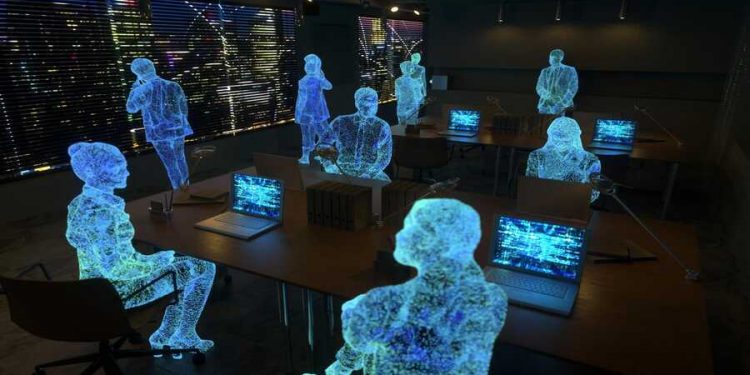The Metaverse is an emerging virtual platform with applications in gaming, social media, and e-commerce. As this technology continues to evolve, it’s essential to explore how the Metaverse will impact the future of work and the labor market. In this article, we will discuss the potential implications of the Metaverse on the workforce.
Virtual Jobs
One of the most significant potential impacts of the Metaverse on the labor market is the creation of virtual jobs. As companies and individuals increasingly adopt the Metaverse, the demand for virtual workers who can design, develop, and maintain these virtual environments will grow. Virtual jobs could range from designers and developers to virtual event planners and customer service representatives.
Remote Work
The Metaverse could also lead to an increase in remote work opportunities. As virtual jobs become more prevalent, workers could access job opportunities from anywhere in the world, breaking down geographical barriers and creating new opportunities for individuals in remote or underserved communities.
Augmented Reality and Virtual Reality Training
The Metaverse could also create new opportunities for training and education through the use of augmented reality and virtual reality technologies. Companies could use these technologies to train employees in virtual environments, allowing them to practice and develop new skills in a more immersive and interactive way.
Collaboration and Communication
The Metaverse could also lead to new forms of collaboration and communication in the workplace. Virtual environments could create more natural and intuitive ways for workers to interact with each other, fostering collaboration and innovation. Additionally, virtual environments could provide new opportunities for remote teams to work together and connect with each other in real-time.
New Economic Models
The Metaverse has the potential to create new economic models and disrupt traditional industries. For example, virtual goods and services could become more prevalent, creating new opportunities for entrepreneurs and businesses. Additionally, the rise of virtual jobs and remote work could lead to new forms of economic activity, such as virtual marketplaces and gig economies.
Digital Skills and Training
The rise of the Metaverse could also lead to an increased demand for digital skills and training in the workforce. Workers may need to develop new competencies to adapt to virtual work environments, such as virtual collaboration and communication skills, familiarity with virtual reality tools, and virtual customer service skills. Companies and training institutions can help meet this demand by offering specialized training and educational programs for these emerging digital skills.
Virtual Economy
The Metaverse has the potential to create a new virtual economy, where virtual goods and services can be bought and sold using virtual currency. As virtual commerce continues to grow, this could lead to new forms of entrepreneurship and job creation, such as virtual real estate developers, virtual item designers, and virtual shopkeepers.
Intellectual Property and Copyright
As the Metaverse creates new forms of economic activity and virtual goods, it also creates new challenges for intellectual property and copyright law. Developers, businesses, and policymakers must consider how to ensure that intellectual property rights are respected within the Metaverse and how to protect creators’ rights to their virtual creations.
Accessibility and Inclusivity
As the Metaverse continues to evolve, it’s crucial to prioritize accessibility and inclusivity for all users, including those with disabilities or who may face other barriers to virtual work. Developers and businesses must ensure that virtual work environments are accessible and inclusive, incorporating features such as closed captioning, audio descriptions, and other assistive technologies.
Cybersecurity
The Metaverse presents new challenges for cybersecurity, as virtual environments may be vulnerable to hacking, data breaches, and other forms of cyber attacks. Developers and businesses must prioritize cybersecurity to protect both virtual assets and sensitive user data.
Virtual Work Environments
As virtual work environments become more prevalent in the Metaverse, companies and developers will need to consider how to create effective and engaging virtual work environments. This could include features such as virtual whiteboards, collaboration tools, and immersive virtual spaces for team meetings and brainstorming.
Virtual Reality for Training and Simulation
Virtual reality technologies in the Metaverse can also be used for training and simulation, allowing workers to develop skills and practice real-world scenarios in a safe and controlled environment. For example, medical professionals can use virtual reality to simulate surgeries, and firefighters can train in virtual simulations of fires and emergencies.
Virtual Marketplaces
As the Metaverse creates new opportunities for entrepreneurship and commerce, virtual marketplaces could emerge as a key feature of the virtual economy. These marketplaces could allow virtual shopkeepers to sell virtual goods and services to users across the Metaverse, creating new opportunities for business owners and consumers alike.
Flexibility and Work-Life Balance
The Metaverse could also create new opportunities for flexibility and work-life balance in the workforce. Virtual jobs and remote work opportunities could allow workers to design their work schedules and reduce commuting time, creating a better work-life balance and potentially improving worker productivity.
Challenges for Job Seekers
As virtual jobs become more prevalent in the Metaverse, job seekers may face new challenges in navigating this emerging job market. Employers may prioritize candidates with specialized digital skills and experience in virtual work environments, making it more difficult for individuals without these skills to find virtual job opportunities.
Conclusion
The Metaverse presents significant opportunities for the future of work, including virtual jobs, remote work, augmented reality and virtual reality training, collaboration and communication, new economic models, digital skills and training, and the virtual economy. However, as this technology continues to evolve, it’s essential to prioritize accessibility, inclusivity, and cybersecurity to ensure that the Metaverse can be a positive force for workers and the labor market.
I’m a highly experienced and well-respected author in the cryptocurrency field. I have written numerous articles and books on the subject, and my work is highly sought after by both industry insiders and regular investors alike.
Cryptocurrency is a relatively new and complicated field, but I can make the complex concepts easy to understand for even the novice investors. My writings would be beneficial for anyone looking to get serious about making money in this exciting new market.
In addition to my writing, I’m also an active investor myself, and have made a significant profit from investing in cryptocurrencies. I frequently speak at investment conferences and seminars to share my knowledge on the market with fellow investors.









